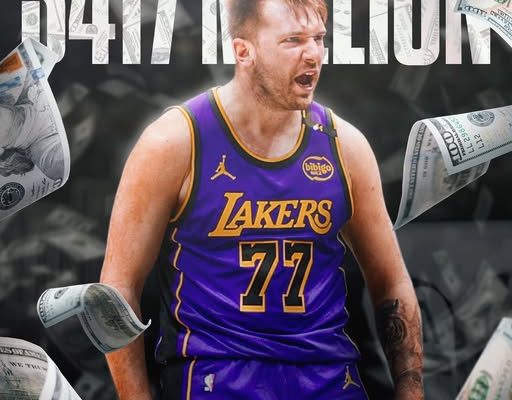The NBA landscape shifted once again when Luka Dončić, the Slovenian superstar and one of the league’s most gifted generational talents, signed an extension with the Los Angeles Lakers. With this move, not only does Dončić solidify his long-term commitment to one of basketball’s most storied franchises, but he also places himself in line for what would be the largest contract in NBA history: a potential five-year, $417 million deal once his current extension concludes. The implications of such a deal ripple far beyond just salary figures—it reshapes how superstars negotiate contracts, how front offices manage their cap sheets, and how the league continues to evolve economically in an era of ever-expanding revenue.
For Dončić, this extension cements his place among the highest-paid athletes in the history of professional sports, not just basketball. The mere possibility of a $417 million deal would have seemed fantastical even a decade ago, but it now represents a natural progression in a league where television rights, global branding, and digital expansion continue to fuel revenue growth. The NBA’s collective bargaining agreement, which allows for supermax contracts based on years of service and All-NBA selections, is designed to retain superstar talent and reward loyalty. Luka has already met and exceeded the necessary qualifications. Now, he stands to cash in like no player before him.
The Lakers’ decision to invest heavily in Dončić is not just about what he brings to the court—although what he offers is nearly unparalleled. Since entering the league, he has demonstrated the rare combination of scoring prowess, court vision, leadership, and clutch performance that few in the history of the game can match. From triple-doubles to game-winning daggers, Dončić plays with a flair and intelligence that makes him not only a fan favorite but a cornerstone of championship aspirations. The Lakers, ever in pursuit of titles, saw in Dončić the perfect heir to the pantheon of legends who have worn the purple and gold—from Magic Johnson to Kobe Bryant to LeBron James.
But beyond the talent, there’s a calculated business strategy behind this extension. Signing Dončić now ensures the Lakers hold his Bird Rights, allowing them to offer him the richest deal possible once he becomes eligible again. The math behind the $417 million figure is rooted in expected salary cap increases projected over the next few years, driven by a new media rights deal expected to inject billions into the league’s coffers. The NBA’s current financial trajectory all but guarantees that the supermax value will continue to grow, and players like Dončić—who consistently meet the All-NBA criteria—will be the biggest beneficiaries.
For the Lakers, it’s a move that reaffirms their identity as a franchise built around superstars. Their entire model, from marketing to team construction, revolves around the acquisition and retention of elite talent. Locking in Dončić now, and preparing for the inevitable $417 million re-signing, shows an organization willing to commit maximum resources to remain competitive in both the short and long term. It also places pressure on the front office to build a contending roster around Dončić—something that hasn’t always been easy in the salary cap era, especially when one player consumes such a large portion of the payroll.
Dončić’s looming $417 million eligibility could also serve as a new benchmark for other rising stars. As players and agents become increasingly savvy in structuring contracts, this move sets a precedent. It signals that locking in early with a major-market team, maintaining All-NBA level performance, and timing extensions strategically can result in historic earnings. In a league where player movement is increasingly common, teams will have to compete not just with culture and winning opportunities but with financial maneuvering that maximizes a star’s earning potential over a decade or more.
The potential deal is also bound to reignite discussions around salary caps, roster flexibility, and the very structure of NBA team-building. Critics will point out that contracts of this size, while deserved for a player of Dončić’s caliber, can handicap teams from building balanced rosters. There’s truth to that, but there’s also a counterargument: stars like Luka elevate lesser players and draw in veterans willing to take discounts for a shot at a title. His gravity on the court and magnetism off it provide enough value to justify the financial strain.
The Lakers are undoubtedly betting on that equation. They believe that Dončić, with the right pieces around him, can be the face of a new Lakers dynasty. And Dončić himself, now in one of the league’s premier markets with global exposure and championship infrastructure, has all the tools to achieve greatness. While he has already made a significant mark with individual accolades and playoff heroics, he now has the opportunity to translate personal brilliance into team success at the highest level.
The impending $417 million contract also symbolizes a shifting NBA, where international stars now command the same financial and cultural weight as their American counterparts. Luka’s rise from Real Madrid to the NBA, and now to the possibility of being the highest-paid player in league history, is a testament to the globalization of the sport. The Lakers, ever attuned to narrative and legacy, are leaning into that transformation with full force.



